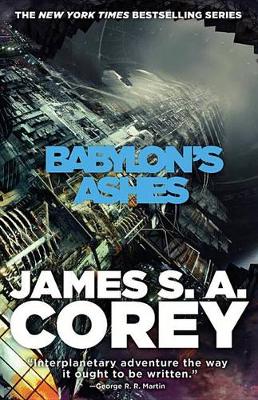
clq
Written on May 10, 2018
A lot is going on in Babylon's Ashes, and for all that is going on, not that much is actually happening. The way the story is told in this book differs a bit from the previous books, as we also get to join the "bad guys" as narrators. I can see what might have been achieved by this, making the morals of the story feel less black and white, but I just don't think it works. We never get the time to care enough about the characters representing the "other side" to appreciate why they are thinking what they are thinking. Sure, we're all but told what is going on in their heads, but it's not convincing at all. And the attempt to do this becomes a distraction from what made the other books so good.
So much of the strength of the other books has been in the empathy I felt with the characters, but in Babylon's Ahses the inner workings of the characters just don't win through when set up against all the distractions. The narrative jumps around too much and too often to really allow for the deep-dive into the motivation and feelings of the characters that the other books offered up. On the one hand this gave me a new appreciation for how cleverly crafted the other books have been to allow for this to seem to natural. Before this book I thought it would be practically impossible for me to read a paragraph of James Holden doing something as trivial as drinking coffee without being charmed to my knees. This book proved that Holden's implicit charm is not necessarily always there. There are attempts at bringing the reader into the heads of the main characters in the way the other books have done, but they feel rushed, and for me they fell flat.
That's not to say there aren't great moments in this book. There are several scenes that pack a proper emotional punch, but most of them are the internal monologues of the characters, what they are thinking rather than the motivation behind what they are doing. The actions that drive the plot in this book start feeling a lot like pieces of a jigsaw-puzzle that are moving around to wherever they need to be to finish off the puzzle. And the picture the pieces end up creating becomes quite clear before all the pieces fall into place.
One thing I'd say for this book is that it does quite a good job in fleshing out the villain in ways that aren't obvious. I started disliking him, not just for the terrible things he did, but also for the way he thought about things, and the ways he interacted with the characters around him. And that's one example of why I, despite not liking this book as much as the ones prior to it, didn't ever turn against it. I didn't feel like it was being lazy. To me it read like a book that didn't quite manage to chew all that it bit off. It had the makings of, and the potential to be, just as good as the other books in the series. I just didn't think it was. I felt like, of the six hurdles in The Expanse series so far, this is a hurdle that the storytelling of the book didn't quite make it over, despite putting in a good effort.
I'm more than happy to allow for that, and I hope and expect that the seventh book will have me gushing at this series again.

